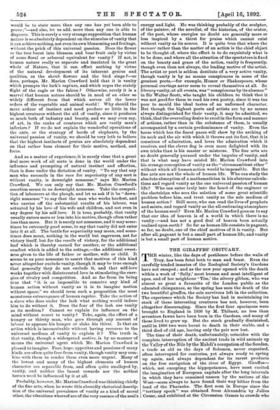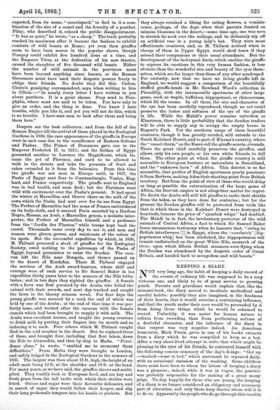THE GIRAFFES' OBITUARY.
The time of their death, unfortunately, coincides with the completelnterruption of the ancient trade in wild animals up
the Valley of the Nile by the Mahdi's oeoupation of the Soudan,
a trade as old as the days of Solomon, never organised, often interrupted for centuries, yet always ready to spring up again, and always dependent for its rarest products on the free navigation of the river of Egypt. Giraffes— which, not excepting the hippopotamus, have most excited the imagination of European capitals after the long intervals in which they have remained unseen by the nations of the West—seem always to have found their way hither from the land of the Pharaohs. The first seen in Europe since the "tertiary epoch" was obtained from Alexandria by Julius Cresar, and exhibited at the Circensian Games to crowds who expected, from its name, "camelopard," to find in it a com- bination of the size of a camel and the ferocity of a panther. Pliny, who described it, echoed the public disappointment -" It was as quiet," he wrote," as a sheep." The trade probably reached its maximum after it became the fashion to exhibit combats of wild beasts at Rome ; yet even then giraffes seem to have been scarce in the popular shows, though Pompey could exhibit five hundred lions at a time, and -the Emperor Titus, at the dedication of his new theatre, caused the slaughter of five thousand wild beasts. Either the number of wild animals in the provinces must have been beyond anything since known, or the Roman Governors must have used their despotic powers freely to -oblige their friends. No doubt they did this. Cretins, Cicero's gossiping correspondent, says, when writing to him in Cilicia :—" In nearly every letter I have written to you about panthers. It is a great shame. Pray send to Pam- phylia, where most are said to be taken. You have only to give an order, and the thing is done. You know I hate trouble, while you like it, and yet you will not do this, which is no trouble. I have sent men to look after them and bring them here."
Despots are the best collectors ; and from the fall of the Roman Empire till the arrival of those placed in the Zoological Gardens in 1836, the rare appearances of the giraffe in Europe were in each case due to the munificence of Eastern Sultans and Pashas. The Prince of Damascus gave one to the Emperor Frederick II. in 1215; and the Soldan of Egypt presented another to Lorenzo the Magnificent, which be- came the pet of Florence, and used to be allowed to walk in the streets and take the presents of fruit and eakes extended to it from the balconies. From this time the giraffe was not seen in Europe until, in 1827, the Pasha of Egypt sent four to Constantinople, Venice, Eng- land, and France respectively. The giraffe sent to England was in bad health, and soon died ; but the Parisians went wild with excitement over the Pasha's present. It had spent -the winter at Marseilles, and throve there on the milk of the cows which the Pasha had sent over for its use from Egypt. 'The Prefect of Marseilles had the arms of France embroidered on its body-cloth, and it entered Paris escorted by a Darfour Negro, Hassan, an Arab, a Marseilles groom, a mulatto inter- preter, the Prefect of Marseilles himself, and a professor from the " Jardin des Plantes," while troops kept back the crowd. Thousands came every day to see it, and men and women wore gloves, gowns, and waistcoats of the colour of Its spots. But the successful expedition by which, in 1836, M. Thibaut procured a stock of giraffes for the Zoological 'Society, owed nothing to the patronage of the Pasha of Egypt, beyond permission to enter the Soudan. The cars- -van left the Nile near Dongola, and thence passed on -to the desert of Kordofan. There M. Thibaut engaged -the services of the Arab sword-hunters, whose skill and courage were of such service to Sir Samuel Baker in his -expedition thirty years later to the sources of the Nile tribu- taries; and in two days they sighted the giraffes. A female -with a fawn was first pursued by the Arabs, who killed the -animal with their swords, and next day tracked and caught the fawn in the thorny mimosa scrub. For four days the young giraffe was secured by a cord, the end of which was held by one of the Arabs ; at the end of that time it was per- iectly tame, and trotted after the caravan with the female camels which had been brought to supply it with milk. The Arabs were excellent nurses, and taught the young creature to drink milk by putting their fingers into its mouth and so inducing it to sack. Four others which M. Thibaut caught died in the cold weather in the desert. But he replaced three of these, and brought four, including that first taken, down the Nile to Alexandria, and then by ship to Malta. " Provi- dence alone," he wrote, "enabled me to surmount these difficulties." From Malta they were brought to London, and safely lodged in the Zoological Gardens in the summer of 1835. The largest was then about 11 ft. high, the height of an adult male being 12 ft, at the shoulder and 18 ft. at the head. For many years, as we have said, the giraffes throve and multi- plied. They readily took to European food, and ate hay and fresh grass from the tall racks with which their stables were fitted. Onions and sugar were their favourite delicacies, and in search of sugar they would follow their keeper, and slip their long prehensile tongues into his hands or pockets. But
they always retained a liking for eating flowers, a reminis- cence, perhaps, of the days when their parents feasted on mimosa blossoms in the desert,—some time ago, one was seen to stretch its neck over the railings, and to delicately nip off an artificial rose in a young lady's hat. They were most affectionate creatures, and, as M. Thibaut noticed when in charge of them in Upper Egypt, would shed tears if they missed their companions or their usual attendants. But the development of the lachrymal ducts, which enables the giraffe to express its emotions in this very human fashion, is less obvious than the wonderful size and beauty of the eyes them- selves, which are far larger than those of any other quadruped For curiosity, now that we have no living giraffe left in England, we would suggest a comparison of the beautifully stuffed giraffe-beads in Mr. Rowland Ward's collection in Piccadilly, with the innumerable specimens of other large game, such as wapiti, buffaloes, hippopotami, or rhinoceroses, which fill the rooms. In all these, the size and character of the eye has been carefully reproduced, though no art could preserve the lustre and softness of the eye of the giraffe in life. While the Mahdi's power remains unbroken at Khartoum, there is little probability that the Soudan traders will be able to supply any to occupy the empty house in Regent's Park. Yet the southern range of these beautiful creatures, though it has greatly receded, still extends to the North Kalahari Desert, and to part of Khama's country, where the "camel-thorn," as the Boers call the giraffe-acacia, abounds. There the great chief carefully preserves the giraffes, and allows only his own people, or his own white friends, to kill them. The other point at which the giraffe country is still accessible to European hunters or naturalists is Somaliland, and the "unknown horn" of Africa. This district is so far accessible, that parties of English sportsmen yearly penetrate it from Berbera, making Aden their starting-point from British territory. But from the point of view of those who would delay as long as possible the extermination of the large game of Africa, the Dervish empire is not altogether matter for regret. No doubt the Arabs will still kill giraffes to make their shields from the hides, as they have done for centuries ; but for the present the Soudan giraffes will be protected from raids like that in which those in the Kalahari Desert were destroyed in hundreds, because the price of " sjambok whips" had doubled. The Mahdi is, in fact, the involuntary protector of the wild animals of Central Africa, a fact to which Sir Samuel Baker bears unconscious testimony when he laments that, "owing to British interference [1] in Egypt, where the courbatch ' [hip- popotamus whip] has been abolished, the hippopotamus will remain undisturbed on the great White Nile, monarch of the river; upon which fifteen British steamers were flying when the Soudan was abandoned by the despotic order of Great Britain, and handed back to savagedom and wild beasts."

































 Previous page
Previous page